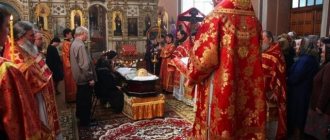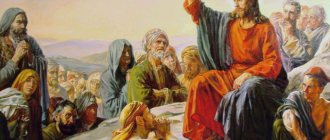- Islam and Christianity about Paradise
- What is Paradise?
- Who will go to Heaven?
- What's happening in Paradise? What do people do in Paradise?
- Will what is forbidden on earth be forbidden in Paradise?
- How to get to Paradise?
- Conditions
For every person, one of the most important questions that he must understand throughout his life is the question of what direction his life and existence have, and who and along what path leads him throughout his life.
How a person relates to the very fact of death and what idea about it he has the most confidence in determines the meaning of human life and the path he takes through his life to death, determines his moral character and deeds, behavior and worldview.
What is heaven in our understanding?
All these ideas share common features: in heaven there is no pain, fear and time. Harmony, peace of mind and freedom reign there. There all the divine radiance illuminates, and the inhabitants are forever young and infinitely happy.
However, these descriptions are only a weak attempt to imagine heavenly life. Theologians claim (and, most likely, they are right) that earthly man is not able to imagine a true paradise. The soul is too burdened with worldly vanity and involuntarily binds higher matters to a primitive understanding of happiness.
What sins and deeds will not allow you to enter Paradise?
According to Islam, a person will be held responsible only for those acts that he himself has committed, and God has said that “ not a single soul will bear another’s burden ” (35:18). Islam refutes the concept of original sin, which is cultivated in Christianity: neither children, nor grandchildren, nor great-grandchildren are to blame for the fact that their father made a mistake, and they cannot accept punishment.
The Prophet Muhammad ﷺ said that it is common for every person on earth to make mistakes: in a hadith transmitted by at-Tirmidhi, he indicates that “ every son of Adam ” commits sins. But the Almighty Lord did not create man in such a way that he was helpless before his sins and sinful thoughts and could not resist them: man was given the opportunity to do good deeds, repent, and the doors of repentance are always open to man by the Almighty. In the same hadith, the Messenger of Allah ﷺ called those who repent the best of all those who commit sins.
The pleasure of Allah is the main measure of how righteously a person has lived, done good deeds and is worthy of going to Paradise.
Heaven exists - what do researchers and those who have “visited” explain?
With the development of resuscitation and the acquisition of the ability to pump out people in a state of clinical death, indirect evidence has appeared that heaven is not a fairy tale. As atheists say, “there’s something there.”
Up to 20 percent of people whom doctors were able to bring out of a coma talked about a tunnel, a light, where they were drawn, a door or a gate. From the threshold of which the patients were “turned away” by resuscitators.
Added to the visual impressions was a feeling of serenity and anticipation of the upcoming entry. Scientists have tried to explain these memories as processes of brain dying. They say that at this time the patient loses vision and ceases to see peripheral zones. And the “spotlight” visible to him is the central point, still accessible to the eyes that are switching off.
But many researchers strongly disagree with this interpretation. Thus, the Belgian neurologist Steven Laureys, who has headed the Coma Science Group in Liege for many years, talked with each person rescued.
According to the tests that patients underwent, the emotions they experience when encountering light are many times stronger than anything that people have encountered during their lives. The doctor cannot explain this surge by dying alone. He does not undertake to explain why the majority of people who have been brought out of clinical death, in principle, cease to be afraid of death.
The data obtained from resuscitated blind people is also interesting. Among them were those who were blind from birth. However, they also saw the light and the entrance. Orthodox science cannot explain how blind people, who by definition cannot see, could visualize images, and in such detail. Oxygen deficiency definitely has nothing to do with it.
But the case of a 4-year-old boy who experienced clinical death and delighted his parents and doctors with stories about angels is completely unique. This is despite the fact that I grew up in a family of atheists and never heard about these creatures from anyone.
In addition, he told about his meeting with his sister. And she died in childbirth long before the boy was born. Of course, the parents, so as not to traumatize their son, did not tell him about the dead girl. Too unexpected a topic for hallucinations, isn't it?
The Mystery of the Primordial Paradise
I want to look there at least out of the corner of my eye. See what the souls of saved people are doing there. Are they carrying out any activities? Or are they resting? How do they spend their allotted time? And is it possible to find time where eternity reigns?
Usually we hear that the righteous will find bliss, receive crowns for patiently bearing sorrows and, together with the angels, begin to glorify God. But isn't it boring? We prayed, sang praises to God, rested under the shade of the trees of paradise from the hard labor we endured on earth, and then what? We hear that “God will wipe away every tear from their eyes” (Rev. 21:4), that is, He will make up for all losses, heal wounds, and deliver from sorrow. But here it is, eternity - the tears have long dried up, there is peace and tranquility in my soul, what to do? For - there is such a peculiarity within us - the human soul does not tolerate inactivity. What is heavenly life filled with?
The Secret of Paradise Life
This is the parable that St. Silouan of Athos once shared. An eagle soared high in the sky. Contemplating the beauty of the world, he wanted to tell about this to the rooster who was below, in a simple rural chicken coop. But when he came down, the rooster was walking importantly among his hens and did not particularly listen to the eagle. The rooster did not understand anything that was said, for he did not even see out of the corner of his eye what the eagle was contemplating. Soon he became completely bored with these sublime stories. Likewise, those who live on earth cannot understand heavenly things.
The life of Paradise is a mystery for the exiles of Paradise. The exiles of Paradise are not given any extra reason to fantasize about what is there. Fantasies about the spiritual usually turn into disaster.
There is such a problem - everyone has their own measure of perception, beyond which reasoning is meaningless. The baby does not understand the adult. The blind man is an artist. The deaf man is a musician. How to explain to a cannibal savage who doesn’t know the letters the meaning of ancient manuscripts? Using them to light a fire, the savage will cook a lover of manuscripts on the fire and continue his wild life. It is not possible to explain everything to everyone. Misunderstanding turns into rejection, and rejection turns into hostility. Enmity with what is not understood, people destroy temples, not even suggesting that the temple is Heaven on earth, the remnant of Paradise in the midst of our sinful world.
God has prepared such goodness and happiness for people in Paradise that they cannot even come close to experiencing on earth
Paul the Apostle, raptured into Paradise, even to the third Heaven, came into contact with that which “cannot be told to man” (2 Cor. 12:4), that is, with the ineffable. He would like to tell, but he just didn’t know how. The only thing that he expressed in his admiration was that “eye did not see, nor ear heard, nor did it enter into the heart of man what God had prepared for those who love Him” (1 Cor. 2:9). That is, God has prepared such goodness and happiness for people in Paradise that they cannot even come close to experiencing it on earth.
However, the apostle continues: “But God revealed this to us by His Spirit” (1 Cor. 2:10). So, we can still say something.
Why did God put man in Paradise?
Divine Revelation tells us that God did not place man in the primordial Paradise so that he would carelessly lie under a palm tree and pick fruits from the trees of Paradise. No, the Scripture says:
“And the Lord God took the man whom he had created, and settled him in the Garden of Eden, to cultivate it and keep it” (Gen. 2:15).
Do not sunbathe in the sun or carelessly splash in the azure waves of the rivers of paradise, but cultivate the Garden of Eden and preserve it. Thus, in the primordial Paradise, man was ordered to be busy, take care of Paradise - cultivate and store.
It was not Paradise that needed cultivation, for God creates everything in perfection, without lack. Paradise was fragrant with the presence of God's grace. Man needed this cultivation. Excessive peace leads to carelessness. Carelessness leads to idleness. And “idleness has taught many evil things” (Sir. 33:28). Man, although created pure, has not yet had the experience of spiritual formation, in which work, the discovery of God-given talents and perseverance in emerging temptations are inseparable.
Actually, the tree of the knowledge of good and evil was given in order to cultivate loyalty to God in people. Loyalty would be expressed in cutting off from the earth created by God every temptation of the seducer. Education presupposed labor on the part of the person, effort.
The work of heaven, what exactly it consisted of, is still completely incomprehensible and unclear to us. According to the words of St. John Chrysostom, it was “painless work, alien to suffering.” It represented the path to greater spiritual perfection. We dare to say that the cultivation of Paradise presupposed some kind of creative activity of man, his deep, rational-personal inclusion in the heavenly harmony of the pristine world, breathing with the grace of the Holy Spirit.
It is revealed to us that Adam named the animals (cf. Gen. 2:19-20). But in order to name, you need to know, comprehend those whom you want to name. A scientist who discovers a new star gives it a name. Adam, comprehending the world created by God, gave names, trying to penetrate the mystery of the universe. And this is not idleness, but deep, creative, intelligent-willed activity. Naming a name, that is, expressing one’s knowledge in words, means that a person has formulated the fruits of his cognitive activity.
His soul, body, mind, and heart—all his rational-volitional qualities—participated in the heavenly work of the primordial man.
More tasks in primordial Paradise
Apparently, in the primordial Paradise people were given many tasks. In particular, it says:
“And let them have dominion over the fish of the sea, and over the birds of the air, and over the wild animals, and over the livestock, and over all the earth, and over every creeping thing that creeps on the earth” (Genesis 1:26).
As long as man maintained his unity with the Lord, the light of God’s grace poured into the world through man
To rule, you need to be capable of it and know how to rule.
The world of living beings was not in chaos or the destruction of the weakest by the strongest. The world was different, dissolved with the grace of the Holy Spirit. No death, no predation. But the order and harmony of the universe were maintained through human activity, as the crown of God's creation. As long as man maintained his unity with the Lord, the light of God’s grace poured into the world through man, spiritualizing all existence.
Venerable Macarius the Great reveals a secret to us:
“The enemy, having deceived Adam, and thus dominated him, took away his power, and himself was called the prince of this age. In the beginning, the Lord made man the prince of this age and the ruler of what is visible. Neither the fire overcame him, nor the water drowned him, nor the beast harmed him, nor the poison-bearing animal could have its effect on him. But after he yielded to the deception, he also betrayed his superiors to the deceiver.”
And who would have thought that the title “prince of this world” was stolen by the devil from... a person? But that's how it is. In the earthly world, initially the king is the one who carries within himself the image of the King of Heaven. The Heavenly King - God - captured the royal image of man - the earthly king. A pious kingdom is not tyranny or tyranny, not the oppression of an insane despot. A godly kingdom is sacrificial care for those entrusted to you by God Himself. Knowing God, man was called to improve himself more and more, and through personal transformation to increasingly transform the world around him.
The royal dominion of primordial man as the crown of creation meant that he was not cut off from God-created nature. He was called to turn to God with his mind and heart, and the world created by God was to be preserved, decorated and supported, just as a fire entrusted for preservation is maintained in the hearth. Negligence results in the extinction of fire, and then cold and freezing.
Also, by the way, one of the tasks of heaven is “be fruitful and multiply” (Gen. 1:28). Nice task? Modern spoiled man understands this task in the most primitive sense. Conceive and abandon - this is what animals devoid of reason do (and even then not all of them), maybe one of the offspring will survive. In order to be fruitful and multiply, a person must be able to take care - of the one who gives birth, and of those who will be born. Caring is a manifestation of love, and without love everything loses its meaning. Also, in order to be fruitful and multiply, you need to be able to educate - pass on to your children something of the best, and this is a whole science, set to man as a task back in the primordial Paradise.
However, the holy fathers interpret this task much more sublimely. Where the spirit reigned over the flesh, the very reproduction of the flesh was implied differently. Here, for example, is how St. John Chrysostom speaks about this:
“Before disobedience (the first people) lived like angels, and there was no (talk about) cohabitation. And how could this be when they were free from bodily needs?”[1]
Saint Ignatius (Brianchaninov) explains:
“This reproduction had to be carried out in all the fullness of chastity and dispassion. Instead of carnal, bestial pleasure there should have been holy, spiritual pleasure. We do not test the image itself, if not revealed by God, believing that just as it was easy for God to allow a certain method, it was so easy to establish another method... In the taking of a wife from her husband (Eve from the rib of Adam) we see an example of the dispassionate reproduction of the human race to the crime.”[2]
And almost all the holy fathers thought so.
Only Blessed Augustine believed that the method of conception in Paradise would be the same as now, but without the passion of carnal pleasures. As he himself says, intercourse would not be subject to lust, but to the will of man,
“proper members would be set in motion by the demand of the will, without passionate excitement, with complete calmness of soul and body and with the preservation of chastity”[3].
No matter how anyone views it, Paradise is not the kingdom of lust.
This was the primordial Paradise. And now Paradise, where the souls of saved people go, is above all carnal things. Such, without the slightest admixture of passion, will be Paradise even after the General Resurrection. And that's why
“those who are deemed worthy to reach that age and the resurrection from the dead neither marry nor are given in marriage, and can no longer die, for they are equal to the angels and are the sons of God, being sons of the resurrection” (Luke 20:35-36).
Heaven after the Fall
Evidence of Paradise in the lines of Scripture is like the reflection of the Sun in small drops of dew. They are insignificant in shape, but the reflections of the Sun shine in them.
Paradise is mentioned at the beginning of Scripture - the book of Genesis. Paradise was built on earth, but it also meant communion with Heaven - the kingdom of angels. The entire created world was God's temple, and Paradise was an altar in which primordial man, like a priest, served the mysteries of God unknown to us. Just as the altar of a temple connects the Heavenly and the earthly, so Paradise in the primordial world is the contact of Heaven and earth, the communion of the earthly with the Heavenly.
Man's sin cut off the earth from Heaven. Paradise remained as the Kingdom of Heaven, but Paradise can no longer be found on earth. And therefore, we are unlikely to be able to reveal the secret of Paradise here on earth. Therefore, a number of tasks set in Paradise remain unsolved. What kind of kingdom, dominion, does man have now? It’s not just a lion, but even a domestic cat doesn’t always listen to him. Man himself plunders nature, like a tyrant-consumer.
Part of the heavenly tasks (“be fruitful and multiply”) was solved by people in their fallen state. With all the ensuing consequences - fornication, adultery, abortion, that is, with complete arbitrariness. Some of the problems will be solved only in the future, when by the power of the Risen Lord everyone will rise from the dead, and the new heaven and new earth will amaze the eyes of the resurrected people.
In the Old Testament, Paradise was practically not mentioned after the Fall. Why talk about what is closed until the coming of Christ the Savior? Why grieve the souls of the righteous, who went to hell, like all the exiles of Paradise? “Descending with sorrow into the underworld” (Gen. 37:35), the Old Testament man experienced melancholy and loneliness.
Paradise was mentioned in the Old Testament as an image of God's blessing. For example, it is said:
“Charity is like paradise, full of blessings, and almsgiving endures forever” (Sir. 40:17).
“The fear of the Lord is like a blessed paradise, and clothes it (who has the fear of God - Ed.) with all glory” (Sir. 40, 28).
Every virtue contains something heavenly in itself. Humility, meekness, chastity, especially royal love - reflections of Paradise on our sinful earth.
Humility, meekness, chastity, love - reflections of Paradise on our sinful earth
Paradise was closed until He came who said: “Today you will be with Me in Paradise” (Luke 23:43). He said this to the repentant thief, so that each of us, firstly, would see a thief in himself, and secondly, so that each of us would also say repentantly:
“We have received what is worthy of our deeds... Remember me, Lord, when you come into Your Kingdom” (cf. Luke 23:41-42).
The Bible does not talk about what a person will do in Paradise, but about what it is like for a person outside of Paradise, how bad and bad it is without God, and therefore how to return to God and find Paradise again. Man is a prodigal son, instead of his home there is a pig trough, instead of love and warmth there is lies and deception, and also immeasurable suffering, sorrow, torment. But the Father lovingly waits, and the gates of his home are open. Otherwise, the curtain of the Old Testament temple would not have been torn at the dying words of the Savior, “It is finished.” Paradise - the primordial altar - is now open to man called to heavenly mysteries.
Hell as the antipode of Heaven
So, it is revealed to us that there are no idlers in Paradise. But the underworld is filled with idlers. Where are the “chains of hell” (Ps. 17:6) and “eternal bonds” (Jude 1:6), what scope can there be for creativity and personal endeavor? To appreciate life in Paradise, you need to at least a little imagine the stay of unfortunate souls in hell.
Tormented by their own inner emptiness, having lost the ability to express themselves in anything creatively good, crammed into the underworld like sardines in a barrel, the prisoners of hell are tormented by themselves, by their own uselessness. Their suffering comes from the fact that they lived only for themselves, not wanting to bring even a little benefit to anyone. That is why they are alone - although hell is crowded, but each tormented person is separated from the others by an insurmountable line. Separated from God, separated from their neighbors - no creativity, no activity, no ability to know anything.
If in Heaven there is joy, happiness, bliss, then in hell their antipodes are melancholy, torment and, oddly enough, gloating. The Bible says about the king of Assyria:
“By the sound of his fall I made the nations tremble, when I brought him down to the pit, to those who went to the pit, and they rejoiced in the nether regions” (Ezek. 31:16).
In Heaven they rejoice over everyone who repents. In hell they gloat over every soul washed away by an avalanche of sin into the underworld.
In Heaven they rejoice over everyone who repents, for he is saved. In hell they gloat over every soul washed away by an avalanche of sin into the underworld. Schadenfreude is the reaction of the inhabitants who greet each newly arrived minion.
The Holy Scripture tells us that as soon as the next king of Babylon descended into hell, they recognized him there. Of course, you wouldn’t even recognize the king (and even the Babylonian one)! The prophet Isaiah puts it this way:
“Hell hell began to move for your sake, to meet you at your entrance; awakened for you the Rephaim, all the leaders of the earth; raised up all the kings of the heathen from their thrones. They will all tell you: and you have become powerless, like us! and you became like us” (Is. 14:9-10).
Here they are, the key words - “became powerless.” Actually, hell is the kingdom of the weak and powerless. On earth they seemed powerful, but everything turned into dust. They wanted to reign over others, but were unable to reign over their passions and became enslaved to sinful desires. Therefore it is said:
“He who has an ear, let him hear what the Spirit says to the churches: To him who overcomes I will give to eat of the tree of life, which is in the midst of the paradise of God” (Rev. 2:7).
Paradise is for the strong. For those who have overcome themselves, the world and the devil
Paradise is for the strong. For those who have overcome themselves, the world and the devil.
Powerless, they are also idlers - in the sense of without deeds of goodness, mercy, meekness. Their weakness is their pride. For anyone who exalts himself does not have the strength to humble himself, to see himself as he really is. Such a person will sooner or later be humiliated. Everyone who exalts himself will humble himself. The prophet Isaiah adds:
“Your pride has been cast into the pit with all your noise; the worm lies beneath you, and the worms are your covering” (Isa. 14:11).
In hell there is idleness, inactivity. For hell is the absence of Life. Therefore, no creative activity or manifestation of oneself in any activity can take place where death reigns. There's gray boredom there. No creativity, no mental activity, but only fragments of memories that stand before the eyes of the soul as terrible pictures, and also complete powerlessness to correct anything. That's why there is torment. Because there is no peace there. Just gnashing of teeth and sobbing. Despair, horror and hopeless darkness.
Hell is the inability to show yourself in the good, the time that you missed. If time were measured in kilograms, then we would be horrified at how we throw away time in tons, in countless containers. We spend it for nothing and at the same time think that we are busy.
Another hell - cramped conditions. Without God there is emptiness, limitation, and narrowness in the soul. Where there is tightness, there is languor and burden. Heavenly space and ease of freedom are provided only by God. Life, as a gift from God, is endless expanse, space, breadth - in the correct sense of the word. This is what God calls man to in eternal Paradise.
By what means do you get to Heaven?
Parable of the Rich Man and Lazarus
The Prologue tells about the monk Athanasius, who pondered what awaits in the future life of those who work here for salvation. And in a vision, someone led him to a wonderful gate, the beauty of which is impossible to convey. Through the gates he contemplated glimpses of the wondrous, indescribable life in Paradise. In fact, he could express what he saw and heard only in the words of Scripture: “The righteous will shine like the sun in the kingdom of their Father” (Matthew 13:43). “And they will see His face... And there will be no night there, and they will have no need of a lamp or the light of the sun, for the Lord God gives light to them” (Rev. 22:4-5). But when Athanasius wanted to enter the gates in order to comprehend the secret of Paradise directly, he was told:
“No one who is in laziness enters here, but if you want to enter, step back and strive, not at all thinking about the blessings of the vain world.”
So, Paradise is not the kingdom of the lazy. Paradise is the field of diligent workers who cultivate and preserve Paradise. They cultivate, first of all, within themselves, in the depths of their soul, and then everywhere around them.
But what kind of doing is this?
If you have plowed, sowed, built, designed all your life, if, with knitted eyebrows, you sat behind the drawings or, having undergone incredible training, plowed the expanses of not only air, but also space, then all honor and praise to you! Certificates of commendation and orders, prizes and public recognition are worthy rewards for your diligence. But if at the same time you never needed God, then how will you get into His Kingdom?
One gets to Paradise through works done on earth, but not by those dedicated to the earth. It is not overfulfilled plans, not records, not triumphs of accomplishments that save the soul. God's grace, accepted by a pure, humble heart, saves a person. The soul that is saved is the one who has found God, and not the one who proudly plowed the field of life with the plow of earthly labors.
It is not status, not merit, not visible achievements that pave the way for a person to Paradise.
One elder was shown the Paradise abodes in which the saved lived. And so, he saw in extraordinary glory a certain man who said: “I was a worker for an evil man who constantly annoyed me and did not give me pay, and I endured all this to the end without complaining.” Then the elder saw another who said: “I was a leper, but I endured my serious illness with gratitude to God.” Finally, the elder saw a third husband, although not in such honor as the first two, but also involved in the glory of God. He revealed about himself: “I was a monk for a long time and constantly worked to save my soul; later they made me a bishop.” This is how the bliss of Paradise suddenly opens up - depending on what is inside a person, and not on external achievements. Just like the crowns of heaven, they are given by God not according to our standards or criteria.
Heavenly crowns - they are given by God not according to our standards or criteria
It is true that upon parting with the body, each of us will experience no small surprise. What seemed interesting and important suddenly appears as absolutely nothing. What seemed uninteresting and boring will suddenly open up as the most important and incredibly attractive. Those who thought that Paradise was guaranteed for them will be surprised at the collapse of their self-confidence. And those who believed that they were worthy only of hell, and therefore repented and humbled themselves, will see with surprise how the gates of Mercy unexpectedly opened to them.
(To be continued.)
Where to look for heaven - the opinion of theologians and mystics
The location of the “higher spheres” interests humanity no less than evidence of the existence of paradise. Neither a scientist, nor a mystic, nor a theologian will tell you the exact coordinates. Now one of the most popular versions is the assumption that the tabernacles of paradise are still in heaven. However, it will not be possible to get there even with the help of a space shuttle.
Paradise is located in a different space-time. Or, if you prefer, in some “subtle sphere” inaccessible to material objects.
The Catholic Church does not entirely agree with this formulation of the issue. Thus, the Pope called in 1999 to reject erroneous ideas about heaven as some kind of physical, geographically defined place.
According to the head of the Vatican, heaven is a direct, continuous connection with the Trinity on a spiritual level. And idyllic springs, flowers, lawns among the clouds are a metaphor. It is designed to simplify the understanding and perception of the idea.
However, the Pope’s calls can only suit deeply religious people who follow the principle “I believe because it is absurd.” Scientists continue to search for the location of heaven. And there is some progress in this direction.
Word in all languages
When starting a conversation about whether a paradise lost by man ever existed somewhere, we should immediately say (although this may seem strange to many) that the idea of it is not strictly Christian. You can read about the existence of a place and time where people were once happy long ago in the myths and tales of almost every nation on Earth. Even in the most ancient Sumerian mythology, three thousand years before the birth of Christ, there are references to the fact that once “every thing was perfect” (“Epic of Gilgamesh”), and in this beautiful paradise in which people lived, “no lion kills, no watchman carries away the lamb” (myth of Dilmun). Similar ideas can be found almost everywhere - many ancient civilizations left us similar memories of a lost paradise. One could even say that not paying attention to these memories means simply ignoring the cultural reality that is at least somewhat known to us. Yes, no one knows exactly what this paradise was like - but you can hear that it definitely was in every corner of the Earth. Or we will have to assume that all the ancients were dreamers divorced from reality.
For example, in the Slavic tradition, paradise is a kind of wonderful and bright place outside the known world, almost otherworldly. And the very memory of him is a reflection of some other reality, and in this radiance on the other side of life there is no place for hell. The antonym of paradise lost is not hell after death, but simply ordinary human life, full of illness and labor. After all, it in itself is almost painful for those who remember paradise. And the underworld is already a kind of “addition” to the earth, the usual place of suffering, and the habitat of underground gods associated with death.
By the way, the words “hell” and “gehenna” were directly borrowed by the Slavs from Greek and Jewish culture (respectively, this refers to Hades from the myths of Hellas and the Valley of Hinnom near Jerusalem, in which fiery human sacrifices were once made). The words “hell” and “inferno” are also derivatives of these same concepts; Moreover, all such terms were needed for the first time only when the translation of the Bible into the Slavic language began.
And the Russian word “paradise” itself is of Indo-Iranian origin and literally means “happiness.” Similar words in other languages can carry different meanings - “treasure”, “wealth”, “gift, possession”... The image is clear. Paradise is happiness in its entirety, a priceless gift that has been given to people. But who gave this gift and who took it from people? And can it be returned?
What is heaven - the abode of God?
For example, at the end of December 1994, astronomers managed to decipher images taken using the Hubble telescope. A tiny speck in one of the images caught the attention of Professor Ken Wilson from the University of Florida.
Having examined it with a magnifying glass, the scientist found out that the structure of the fragment was unlike anything previously seen. It was decided to re-shoot this area of star clusters with the highest available resolution. The new images shocked all astronomers. They could clearly see something very similar to a huge shining city of unimaginable size. Next to it, our planet would be no larger than a grain of sand.
Using powerful computers, scientists analyzed the structure, called the “Abode of the Creator,” and found out that all known galaxies begin their path from it. In addition, it turned out that the universe as a whole revolves around this cosmic paradise.
The Hubble web server was open to access at that time. The initial information received was scattered throughout the world. Then NASA restricted access, and further research became classified. And it is unlikely that we will soon be able to find out their details.
Evil in theory and practice
The book of Genesis says that God commanded the people in paradise to fulfill one single commandment - you will eat from every tree in the garden, but you must not eat from the tree of the knowledge of good and evil, for on the day that you eat from it you will die. you'll die
(Genesis
2
:16-17).
By observing it, they would learn to love Him unconditionally - even if the meaning of the commandment was not completely clear to them. As the Queen, the heroine of the fantastic story “Perelandra” by C.S. Lewis, explained the meaning of such a ban, “How can you disobey the One you love?” And in the New Testament, Christ speaks about this very clearly: whoever loves Me will keep My word
(John
14:23
).
This obedience was supposed to demonstrate man’s filial love for God—and so it was for the time being. But man by nature is completely morally free. No moral laws have power over him unless he himself wants to abide by them - but, of course, then he has to accept the consequences of his actions. And, as the Bible says, one day Adam and Eve, seduced by the fallen spirit of evil, decided to break the commandment.
Wanting to deceive man and slander God, the devil asked Eve: did God truly say: do not eat from any tree in paradise?
(Life
3
:1).
Here Satan, as always, outright lied. After all, in fact, God just allowed people to eat from every tree in paradise, except for one tree of the knowledge of good and evil, so the words of the devil actually mean - “is it true that God is so greedy and power-hungry that he forbids you everything?” Eve, not yet understanding what the catch is, clarifies the content of the commandment, but the serpent in response again accuses God of lying! He says to her: no, you will not die, but God knows that on the day you eat them, your eyes will be opened, and you will be like gods, knowing good and evil.
(Life
3
:4-5).
And Eve believed, and ate fruit from the tree, and gave it to Adam. People doubted God, stopped believing Him and violated His only request. Love was betrayed. Happiness is over, and in a world in which everything is very good
, evil and death penetrated, changing it beyond recognition.
And the tree of the knowledge of good and evil is called so strangely not because it really taught a person “the difference between good and evil.” Adam and Eve understood perfectly well from the very beginning that breaking a commandment is evil. Only before the Fall they knew good in practice and evil in theory, but after that it was quite the opposite: good became illusory, and evil became real. Further biblical history confirms this thesis, and the evil in man clearly progressed from generation to generation - after all, Adam’s son, Cain, challenged God himself and even decided to kill his own brother.
Carrying evil within himself, a person clearly could not continue to “live as if in paradise.” After all, even if you forget that from now on the entire world of God, subordinate to man and following him, has also become hostile, then how can you drown out the voice of your own conscience, how can you erase past betrayal from your memory? The whole nature of man, created for happiness, turned out to be distorted by sin. And even if at one moment the universe is healed of evil, a person will not even notice it, because he himself still looks at the world with eyes in which a fragment of the Snow Queen’s ice mirror remains. But such a life is no longer paradise, and it is impossible, even pointless, to create it without first healing the person who will live in it.
Something interesting about Eden
Paradise is not only a place where righteous souls go after death, but, according to Scripture, it is also the starting point of human history. It was from Eden that Adam and Eve were once expelled. Scientists and theologians have been trying for centuries to figure out where the Garden of Eden was located.
Most researchers believe that Eden was located in Mesopotamia, where the Sumerian civilization once flourished. Some insist on the Caucasus, others on the Indian territories between the Indus and the Ganges. Supporters of the African origin of the first man are looking for traces of Eden on the Black Continent (by the way, the Vatican agrees with them).
But there are also alternative, sometimes unexpected theories. Thus, a number of scientists propose to consider Antarctica as the location of the “earthly paradise”. Calculations of planetary fields - magnetic and energy information - suggest that in ancient times the climate on this icy continent was completely different from what it is today.
In addition, ferns and mushrooms have been found in Antarctica. And geothermal springs have been discovered under the ice. This hypothesis is also supported by the activity that scientists from the Nazi Annenerbe showed in this area. Admiral Dennitsa’s report has even been preserved. In it, he notified the Fuhrer that submariners had found a passage to “earthly paradise” off the coast of Antarctica.
Confirming or refuting this theory is complicated by the fact that on the sixth continent, natural conditions are extremely difficult for research all year round. And mankind does not yet have equipment capable of breaking through tens of kilometers of ice.
If traces of the ancient Garden of Eden are found, humanity can learn a lot about its history. Perhaps most of our ideas about the past do not correspond to reality at all. Until the second half of the twentieth century, it never occurred to anyone to move the search point for the Garden of Eden so far to the south.
What heaven looks like
As already mentioned, heaven is a place where pure souls will be in the future. The question of how it looks in reality is one of the most important. All descriptions emphasize that it is impossible to convey in earthly words all the beauty of this place. It is also stated that there are “many mansions” in heaven. For everyone who ends up there, there will be a different monastery depending on how close the soul was to God for the duration of its life. However, everyone in his “abode” will have access to the highest bliss.
Church teachings say that heaven is God's high creation that was created on earth. God stepped there, and while he was not yet separated from the earth, water flowed out of paradise, divided into 4 streams. These streams irrigated the earth, and the water itself connected the Garden of Eden with the earth. Paradise was huge and located on a mountain that was the center of the earth.
In an Orthodox church, heaven is symbolized by the altar. And the temple itself personifies the universe.
Make an effort
“From the days of John the Baptist until now, the kingdom of heaven suffers violence, and those who use force take it by force.”
(Matthew 11:12)
“...with your patience save your souls.”
(Luke 21:19)
In Church Slavonic, “taken by force” sounds like “needs.” Forcing oneself to do good, fighting against sinful desires and thoughts, showing patience in the fight against passions and weaknesses—this is the narrow and thorny path of life for a Christian.
“Enter at the strait gate, for wide is the gate and broad is the way that leads to destruction, and many go in through it.”
(Matt. 7:13)
This narrow path is accompanied by a struggle on the invisible battlefield:
“...our struggle is not against flesh and blood, but against the principalities, against the powers, against the rulers of the darkness of this world, against the spiritual forces of wickedness in high places.”
(Eph. 6:12)
“...the devil fights with God, and the battlefield is the hearts of people.”
(F.M. Dostoevsky)
The Lord is near, ask and it will be given to you
Despite the difficulties of the road to Paradise, Heavenly help will not be slow to come. With God's help, all sins, passions and temptations are overcome. The Lord, testing a Christian on this path, fills the praying heart with Grace, trusting in Him with faith and humility.
This is what the Lord says:
"Ask, and it shall be given you; seek and you will find; knock, and it will be opened to you.”
(Matthew 7:7)
“...and whatever you ask in prayer in faith, you will receive.”
(Matthew 21:22)
“If you ask anything in My name, I will do it.”
(John 14:14)
The holy Apostles call for this:
“...always by prayer and supplication with thanksgiving let your requests be made known to God, and the peace of God, which surpasses all understanding, will guard your hearts and your minds in Christ Jesus.”
(Phil. 4:6-7)
“…let us come boldly to the throne of grace, that we may receive mercy and find grace to help in time of need.”
(Heb. 4:16)
“...let him ask God, who gives to everyone freely and without reproach, and it will be given to him. But let him ask in faith, without any doubt.”
(James 1:5-6)
Daddy, take me home
The entire ancient history of the world, known to us not only from the Bible, is the history of the search for lost happiness. A person solves thousands of questions in life, but he cannot solve one question - how to become happy again and forever? Is it possible to return to heaven?
But the Garden of Eden is long gone, and all attempts to artificially create “heaven on earth” run up against human imperfection. And even if everything around is good, a person can still feel bad - seemingly for absolutely no reason. Blessed Augustine, in his “Confession” addressed to God, explained the reason for this melancholy: “You created us for Yourself, and our heart knows no rest until it rests in You.”
Therefore, from the point of view of Christianity, the entire history of the construction of human states, the creation of various religions, attempts to recreate “heaven on earth” testifies to one thing - in fact, a person does not need paradise at all in the sense of mental well-being and completeness of material wealth - a person needs communication with God
.
In other words, heaven is not a geographical place, but a state
of human nature. And from birth, every person, again and again at all times, stubbornly tests this truth on himself.
But without the desire to return to Heavenly Father, there is no point in desiring a return to that Garden of Eden that was once lost. A child who ran away from home many years ago will not be able to restore a normal relationship with his parents if all he needs from his parents is money and other material goods. You just need to return home and make peace, because love cannot be insincere or selfish - otherwise it is not love. And without love, accepting gifts will torment your conscience.
But how can one be reconciled with God, and will He accept people back? A person’s anxiety about his future can be understood - after all, about the existence of some new
They guessed the future happiness, but neither the Sumerians, nor the ancient Egyptians, nor the Indians, nor the Jews, nor the Slavs knew anything for sure. And the bliss of the great heroes of Greek mythology, who experience eternal bliss after death on the Champs Elysees, generally resembles a feast during the plague. Glorious warriors and children of the gods are happy, while people on earth continue to suffer in the same way as before, and no Herculean labors bring hope for healing the world.
But the hope for happiness is clearly based on something quite solid - after all, dreams that someday all the evils of the world will be somehow corrected are still at least briefly mentioned in a variety of mythologies. However, it is not specified anywhere how this will be done, by whom and when - and the heroes of the epics themselves do not hope for such an outcome at all. They know that there is nothing good ahead of them, and therefore everything good will have to be realized, if possible, by themselves - during their short life on earth. But the most important thing is that they try to live in accordance with their conscience, not because they hope for a reward for righteousness. This philosophy of the so-called “northern courage” is found, for example, in many Scandinavian sagas, and, in fact, is quite close to Christian ethics. And in the Old Testament, all people try to live by the principle of such selfless righteousness, from Adam to Abraham, to whom God was the first to give a firm promise of future benefits in response to true loyalty. Only from then on, people no longer just hoped, but actually knew that God wanted to save them.
And that is why, although the biblical story about the existence of the Garden of Eden and the expulsion of people from there is not unique, only Christians know the special continuation of this story, its outcome. And this is faith in the Savior. At its core, Christianity is the belief that God Himself came to earth in the flesh. He came for a reason, but for the sake of man - to save him from death and introduce him to a new paradise that will exist forever. By the way, there is simply no other religion that claims that God loves us so much that he descended not only to Earth, but even to hell precisely for us, and not for some of his personal reasons.
Robber Rescue
The first man to enter Paradise is not a Christian, but a thief who is crucified on the cross next to Jesus. He killed, robbed, and was justly condemned. But the Lord says to him:
“Truly I tell you, today you will be with Me in Paradise.”
(Luke 23:43)
The first man in Paradise is not a Christian, but a robber.
Experiencing terrible torment, before his death he humbled himself, acknowledged the justice of his punishment, stood up for the innocent suffering Christ, and said:
“Remember me, Lord, when you come into Your Kingdom!”
(Luke 23:43)
He confessed Jesus to be God.
It is not easy to come to terms with failures, illnesses, and to admit the justice of your punishment. Especially on the edge of life and death.
The two thieves on the cross are an image of all humanity. Some suffer and are indignant: “Why?!” Others humble themselves and thank God for everything.
Icon of the Prudent Thief in Paradise










